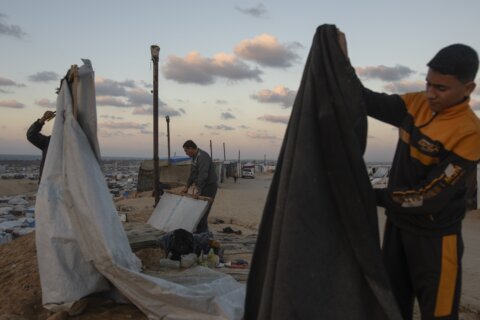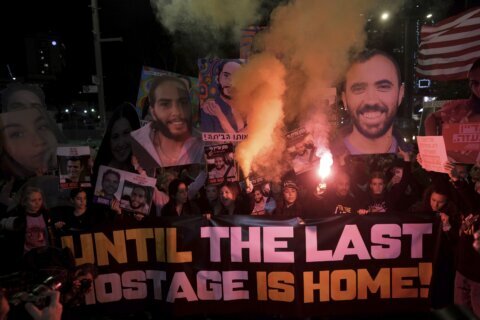A narrow strip of scrubland and sand dunes on the Gaza side of the border with Egypt has emerged as a major obstacle in talks aimed at halting the Israel-Hamas war and freeing scores of hostages.
Israeli Prime Minister Benjamin Netanyahu says Israel must maintain control over the so-called Philadelphi corridor to prevent Hamas from replenishing its arsenal through a network of smuggling tunnels in the area. He says that’s necessary to ensure the group can never again launch an attack into Israel like the one on Oct. 7 that ignited the war.
But many Israelis, including the defense minister, say Israel should relinquish the corridor, at least for a short period of time, in order to secure an agreement to bring back around 100 hostages still held in Gaza, about a third of whom are believed to be dead.
The debate reached a fever pitch this weekend after Israel recovered the bodies of six hostages that the military says Hamas killed as troops closed in. Critics say they could have been returned alive in a cease-fire deal and accuse Netanyahu of sabotaging the talks for his own political interests.
Hamas has demanded a full withdrawal from Gaza and says Netanyahu only raised the demand for the Philadelphi corridor in recent weeks to derail the talks.
Netanyahu blames Hamas for the lack of a deal and says the demand is not new.
Egypt, which has served as a key mediator, is also opposed to any Israeli presence along the Gaza side of its border and says it would threaten the decades-old peace treaty between the two countries, a cornerstone of regional stability.
What is the Philadelphi corridor and why does Israel want it?
The Philadelphi corridor is a strip — only 100 meters (yards) wide in some places— that runs the 14-kilometer (8.6-mile) length of the Gaza side of the border with Egypt. It includes the Rafah crossing, which was Gaza’s only outlet to the outside world not controlled by Israel until the army captured the entire corridor in May.
Israel says Hamas used a vast network of tunnels beneath the border to import arms, allowing it to build up the military machine it deployed on Oct. 7. The military says it has found and destroyed dozens of tunnels since seizing the corridor.
At a news conference on Monday, Netanyahu pointed to a map of the region depicting weapons flowing into Gaza from across the border, saying the corridor provided “oxygen” for Hamas.
Egypt released a statement Tuesday rejecting Netanyahu’s allegations, saying they misled the Israeli public and obstructed cease-fire efforts. Egypt says it destroyed hundreds of tunnels on its side of the border years ago and set up a military buffer zone of its own that prevents smuggling.
What do Netanyahu’s critics say about the corridor?
For weeks, Israeli media have quoted unnamed security officials lambasting Netanyahu, saying the corridor is not essential to Israel’s security and should not hold up a deal to return hostages. Some have suggested an international force could patrol the border, perhaps with remote Israeli sensors.
The dispute sparked a shouting match at a security Cabinet meeting last week, in which Defense Minister Yoav Gallant accused Netanyahu of favoring border arrangements over the lives of the hostages, according to an Israeli official who spoke on condition of anonymity to discuss the closed-door meeting. Gallant was the lone dissenting voice in a subsequent vote in favor of maintaining control over the Philadelphi corridor and has since called on the government to reverse it.
Families of hostages have led months of mass protests calling on Netanyahu to make a deal with Hamas to return their loved ones. The biggest demonstrations yet erupted over the weekend after the killing of the six hostages, including Israeli-American Hersh Goldberg-Polin, one of the best-known captives.
Netanyahu’s supporters say that conceding the Philadelphi corridor now would reward Hamas for killing the captives. They maintain that only relentless military pressure can defeat Hamas, return the hostages and bring about a deal that ensures Israel’s long-term security.
What do Palestinians say about the corridor?
Any Israeli presence inside Gaza would be widely seen as a military occupation, likely prolonging the conflict.
It could also extend, perhaps indefinitely, the closure of the Rafah crossing, which has been a lifeline for Gaza since Egypt and Israel began imposing various degrees of a blockade on the territory after Hamas seized power from rival Palestinian forces in 2007.
For 16 years, it was the only way for most Palestinians to exit or enter Gaza. During the first seven months of the war, it was also the only route available for medical evacuations and the main entry point for desperately needed humanitarian aid.
Israel captured Gaza, the West Bank and east Jerusalem in the 1967 Mideast war, territories the Palestinians want for their own state. It withdrew soldiers and settlers from Gaza in 2005 but continued to control the territory’s airspace, coastline, and all of its border crossings except Rafah.
Hamas has adamantly rejected any Israeli presence in Gaza, including in the Philadelphi corridor and the Netzarim corridor, a buffer zone carved out by Israel separating northern from southern Gaza. Israel says it needs that corridor to search Palestinians returning to their homes in the north to keep militants from slipping in.
Israel denies its demands regarding the two corridors are new, referring to them as “clarifications” of an earlier proposal endorsed by President Joe Biden in a May 31 speech and by the U.N. Security Council.
Israel also accuses Hamas of making unacceptable demands since then, and says the militant group is hindering a deal, including by killing hostages who would be part of it.
What is the position of the mediators?
Biden’s speech and the Security Council resolution referred to a complete Israeli withdrawal. Egyptian officials and Hamas say the demands regarding the corridors were not included in subsequent versions of the U.S.-backed proposal, including one that Hamas said it accepted in early July.
Egypt is deeply opposed to any Israeli military presence along the Gaza border and has refused to reopen its side of the Rafah crossing unless the Gaza side is returned to Palestinian control.
It has accused Israel of violating annexes to the landmark 1979 peace treaty pertaining to Israel’s 2005 withdrawal from Gaza that regulate the deployment of forces along the border. Israeli officials did not immediately respond to a request for comment.
The United States, which is providing crucial military support to Israel while also serving as a mediator, has not taken a position on the corridors, at least publicly, while Hamas has accused it of trying to impose Israel’s demands on the militant group.
Biden said Monday that Netanyahu was not doing enough to bring about a cease-fire, without elaborating.
___
Associated Press writers Tia Goldenberg in Tel Aviv, Israel, Samy Magdy in Cairo, and Josef Federman in Jerusalem contributed.
___
Follow AP’s war coverage at https://apnews.com/hub/israel-hamas-war
Copyright © 2025 The Associated Press. All rights reserved. This material may not be published, broadcast, written or redistributed.









